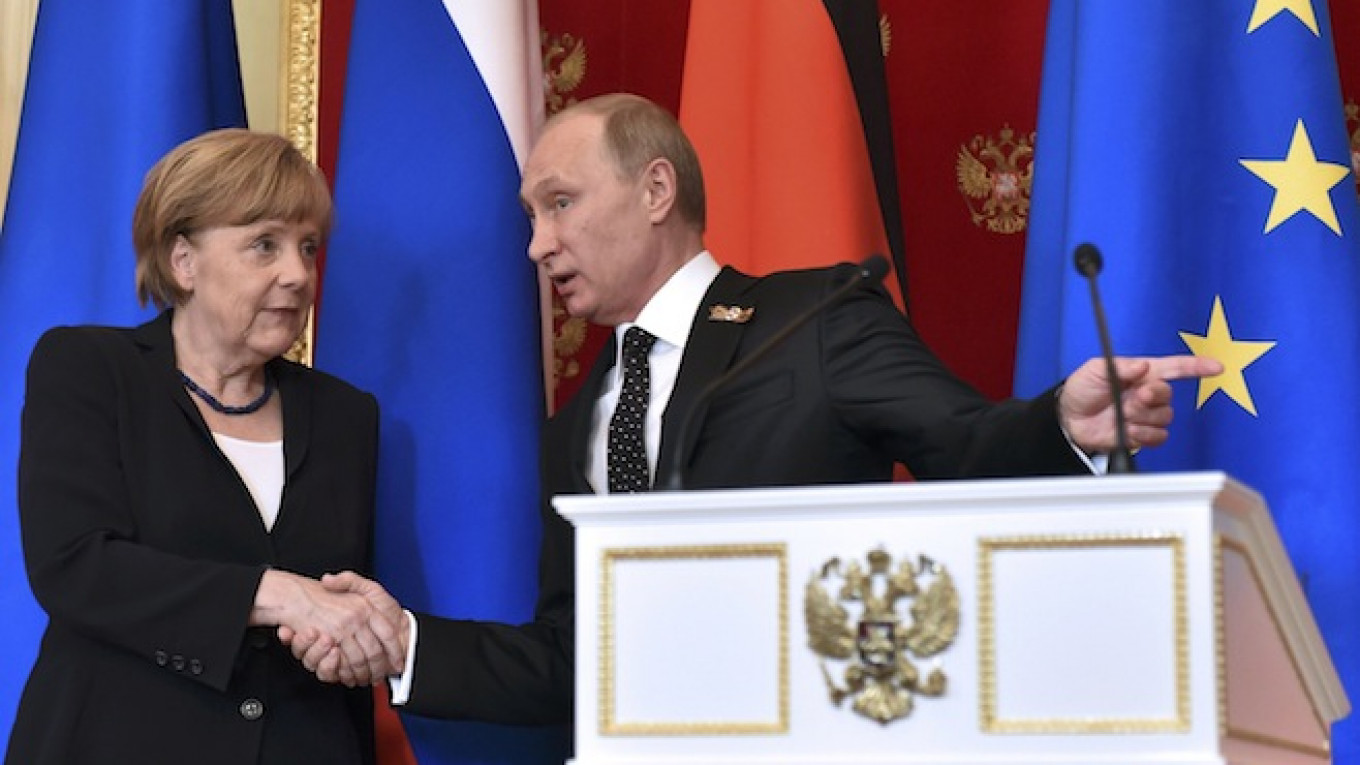President Vladimir Putin insisted that the West should not view Russia as a threat in an interview published Saturday in Italian newspaper Corriere della Sera ahead of an official visit to Italy that kicks off this week.
"I think that only an insane person — and only in a dream — can imagine that Russia would suddenly attack NATO," Putin said, according to a transcript of the interview released by the Kremlin. "I think some countries are simply taking advantage of people's fears with regard to Russia. They just want to play the role of front-line countries that should receive some supplementary military, economic, financial or some other aid."
The outbreak of the Ukrainian crisis and Russia's annexation of Crimea last March have sparked fears in a number of European states, including the former Soviet republics of Estonia, Latvia and Lithuania, that Russia could undermine their territorial sovereignty. The regular interception of Russian military ships and aircraft in the Baltic region has only exacerbated these apprehensions.
Putin also dismissed the notion that Russia had played a role in the deterioration of its relations with the EU and with the West more generally, accusing Europe of adopting a self-interested approach in its relations with his country.
"This [deterioration of relations between Russia and the EU] was not our [Russia's] choice; it was dictated to us by our partners," Putin said. "It was not we who introduced restrictions on trade and economic activities."
Putin claimed that Europe's reluctance to acknowledge the "legitimacy" of Russia's actions or to cooperate with the Russian-led Eurasian Economic Union are examples of the EU's allegedly self-interested attitude.
"We have never viewed Europe as a mistress," Putin said, employing the metaphor used in a question by Italian journalist Paolo Valentino, who had asked whether Russia felt betrayed by Europe "like a lover abandoned by his mistress."
"We have always proposed a serious relationship," Putin said of Russia's ties to Europe.
Despite his criticism of the EU, Putin said that Russia had always enjoyed a "privileged" relationship with Italy and that trust dominated the countries' political interactions.
Putin also blamed the West for deliberately stirring unrest in Kiev during the Maidan street protests of late 2013 and 2014, which led to the ouster of then-Ukrainian President Viktor Yanukovych in February of last year. He said that the situation on the grounds in Kiev at the time had been "in the hands of the U.S. ambassador or a CIA resident."
The Russian president also expressed his commitment to the Minsk agreements signed in February, despite ongoing cease-fire violations in eastern Ukraine. He said Russia would make every effort to influence the authorities of the "unrecognized self-proclaimed Donetsk and Luhansk republics" and urged the United States and EU to exert their influence over Kiev to foster dialogue between the warring parties.
Putin also claimed that Russia had merely recognized Crimeans' desire to join the country when it integrated the Ukrainian peninsula into its federal fold last March.
"I would like to ask those who do not want to recognize it [Crimea as Russian territory]: If our opponents call themselves democrats, I would like to ask what exactly democracy means. As far as I know, democracy is the rule of the people, or the rule based on the will of the people. So, the solution of the Crimean issue is based on the will of the people of Crimea."
The West had claimed that the armed men wearing military uniforms without insignia who had entered Crimea in February 2014 and seized government buildings had been sent by Russia. Putin only admitted after annexation of Crimea that these men — known as "polite people" in Russia — had in fact been Russian troops.
Contact the author at g.tetraultfarber@imedia.ru
A Message from The Moscow Times:
Dear readers,
We are facing unprecedented challenges. Russia's Prosecutor General's Office has designated The Moscow Times as an "undesirable" organization, criminalizing our work and putting our staff at risk of prosecution. This follows our earlier unjust labeling as a "foreign agent."
These actions are direct attempts to silence independent journalism in Russia. The authorities claim our work "discredits the decisions of the Russian leadership." We see things differently: we strive to provide accurate, unbiased reporting on Russia.
We, the journalists of The Moscow Times, refuse to be silenced. But to continue our work, we need your help.
Your support, no matter how small, makes a world of difference. If you can, please support us monthly starting from just $2. It's quick to set up, and every contribution makes a significant impact.
By supporting The Moscow Times, you're defending open, independent journalism in the face of repression. Thank you for standing with us.
Remind me later.


